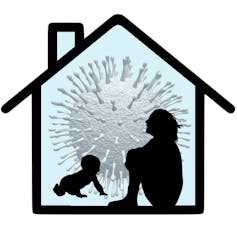Health
Family mental health crisis: Parental depression, anxiety during COVID-19 will affect kids too

An escalation in parental anxiety and depression during COVID-19 not only affects parents’ mental health, but may also have long-term effects on children (File Photo: Fernando @cferdo/Unsplash)
For most parents, to say the the COVID-19 pandemic has been stressful would be a dramatic understatement. The combination of financial pressure, loss of child care and health concerns is exceedingly challenging for families. Mental health problems are expected to rise dramatically as a secondary effect of COVID-19 and the measures that have been put in place to contain it.
The potential long-term consequences on children from increased parental stress, anxiety and depression are only beginning to be understood. However, past research tells us that the children exposed to these problems are more likely to experience mental health problems themselves, in addition to developing an increased risk of learning and behaviour problems and reduced economic mobility throughout their lives.
We need to develop an approach that helps parents now and protects children’s futures.
Escalation in parental anxiety and depression
In our current studies, we report that pregnant mothers and those with young children are experiencing three- to five-fold increases in self-reported anxiety and depression symptoms. A history of mental illness, current domestic conflict and financial stress were associated with worse mental health across multiple child age groups. These figures are especially concerning because young children are highly vulnerable to maternal mental illness due to their near total reliance on caregivers to meet basic health and safety needs.
High rates of parental mental illness combined with children spending more time at home due to COVID-19 present multiple risks, including alterations in children’s stress-system function, higher rates of physical health problems and cognitive impairments.
Read more:
The long-term biological effects of COVID-19 stress on kids’ future health and development
Parenting stress associated with mental illness can lead to negative interactions, including harsh discipline and being less responsive to children’s needs. For parents, depression contributes to health problems and low quality of life. Suicide is a leading cause of death for women of child-bearing age that we expect to increase should high rates of mental health problems continue to be unaddressed.
Mental health system needs urgent improvement
The World Health Organization (WHO) and other child welfare leaders highlight the critical nature of prioritizing parent mental health services so that parents can build their capacity to fulfil children’s health and development needs.
Addressing parental mental illness not only mitigates harmful effects on child health but builds children’s capacities to manage other stressors, such as school transitions and other unpredictable events.
Effective treatments exist for parental mental illness; however, the high barriers to accessing standard care have become even higher during COVID-19. Existing barriers such as the high cost of psychotherapy and childcare demands have been exacerbated due to physical distancing, closure of existing services and closure of daycares and schools.


(Pixabay, Canva)
Shifting treatment options to evidence-based online formats has also been slow and requires substantial investments for large-scale delivery and program refinement in response to current needs. Another problem is that most existing telehealth models do not simultaneously treat parental mental illness and parenting risks, despite substantial evidence for the importance of addressing both.
Notably, parent mental illness is disproportionately experienced in racialized communities that face both racism and systemic oppression. Failing to address the mental health and parenting needs at both the population level and in response to community-identified needs will only perpetuate intergenerational health inequities, such as those experienced by Indigenous and Black Canadians.
Small steps that may help
Although many of the causes of parents’ poor mental health are out of our control, there are small steps you can try right now:
Reaffirm that your emotions make sense. This is an unprecedented time of difficulty that comes with stress, sadness and anxiety. You are not alone in these feelings and wondering about what comes next. Many other parents are similarly feeling distressed and trying to problem solve how to care for themselves and their families.
Talk about your feelings. Sharing your emotions with supportive partners, friends, family members and service providers can be helpful. Brainstorming and problem solving with others can alleviate stress and improve your mood. Just the simple act of sharing can help normalize the fact that you’re working hard and still having a hard time feeling well.
Practise self-compassion. Too often we are kind to others and cruel or dismissive of our own distress. It’s important to prioritize your own well-being and self-care. If you’re experiencing stress, anxiety or depression, talk to and treat yourself like you would a friend. Many people are not used to treating themselves compassionately, but there are resources available to help you cultivate self-compassion.
Seek professional help. If you are having persistent thoughts of self-harm, hopelessness or an increase in alcohol or substance use that is difficult to manage, don’t wait to ask for support. If your low mood or anxiety affects your functioning at home, with friends or at work for two weeks or more, seeking additional help to work through challenges could be important to get to the place you’d like to be.
Urgent action needed on key risk factors
Immediate action is needed to address key risk factors across family, community and policy levels.
The time is now for the development of a national perinatal and family mental health strategy. Early intervention investments are expected to yield high health and economic benefits by preventing the long-term consequences of parental mental illness from becoming embedded in children’s biological and behavioural development.
Investing in family mental health and parenting support now and on multiple fronts, before problems are entrenched, will yield enormous payoffs. It is one governments must prioritize as part of the COVID-19 pandemic response.![]()
![]()
Lianne Tomfohr-Madsen, Associate Professor, Department of Psychology, University of Calgary and Leslie E. Roos, Assistant Professor, Department of Psychology, University of Manitoba
This article is republished from The Conversation under a Creative Commons license. Read the original article.





















